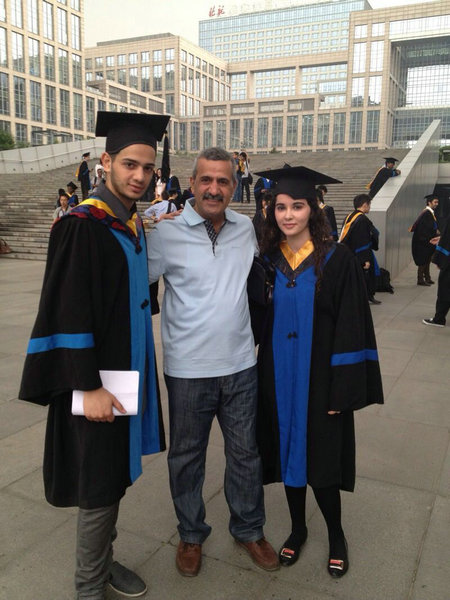 |
|
Abbas Kdaimy and his children at their graduation ceremony in Beijing in 2012.[Photo provided to China Daily] |
In the past years, he has participated in translation projects of Chinese classics, such as Romance of the Three Kingdoms, from English into Arabic.
Impressed by author Luo Guanzhong's narrative style and the portrayal of the novel's characters, he fell in love with it, he says.
"There were hundreds of characters in the novel. But no one is like the other," he says. "I was deeply involved and could even feel the dust of the battlegrounds."
It took him and his colleagues three years to complete the Three Kingdoms project, and an Arabic version is scheduled to be published later in the year. He worked closely with Chinese scholars and also read extensively to learn about historical backgrounds to ensure accuracy in translation.
During the translation process, Kdaimy would often go back to the finished pages when he came up with better phrases.
"I'd even wake up from sleep to note down my ideas, and put the note under my pillow to make sure I remember to change my translation the next morning," he says.
Kdaimy has also worked on many other translation projects that aim to introduce Chinese society to the Arab world. Although such translations aren't as intriguing as literary ones, he gets the benefit of learning about different social topics and events and has gained a deeper understanding of China, he says.
Kdaimy, who compares translation with cooking, says: "It is a challenge to strike a balance between different ingredients and to find the right combination for the readers."
Language, cultural backgrounds and readers' psychology are all important factors to be considered while undertaking such work, he says.
Kdaimy says understanding between the Chinese and Iraqis-especially of their societies-is still limited.
In 2006, Kdaimy invited his friends both in China and Iraq to help rejuvenate the Beijing-based China-Iraq Friendship Association.
The association had been paralyzed for years due to social chaos in Iraq. It has since made efforts to boost mutual understanding and has organized exchange activities between the two countries.
For his contributions to cultural exchanges, Kdaimy was given the Friendship Award in 2014. The award is the highest honor presented by the Chinese government to foreigners who have made significant contributions to the nation's social and economic development.
Kdaimy's love for China is getting stronger with time, he says.
"I have seen both my kids and the city growing up. All my family members love Beijing and want to stay here."
His children-the eldest was 8 when they arrived-can speak and write fluently in Chinese. His two daughters and son are studying for bachelor's and higher degrees at universities in Beijing.
"My biggest dream is that all my kids find good jobs, fit into Chinese society and enjoy stable, happy lives," he says.